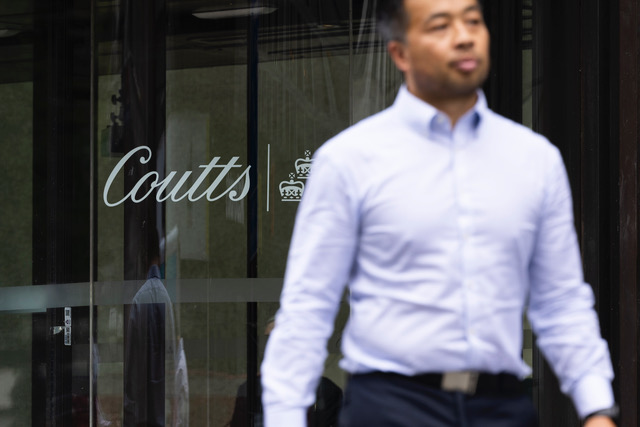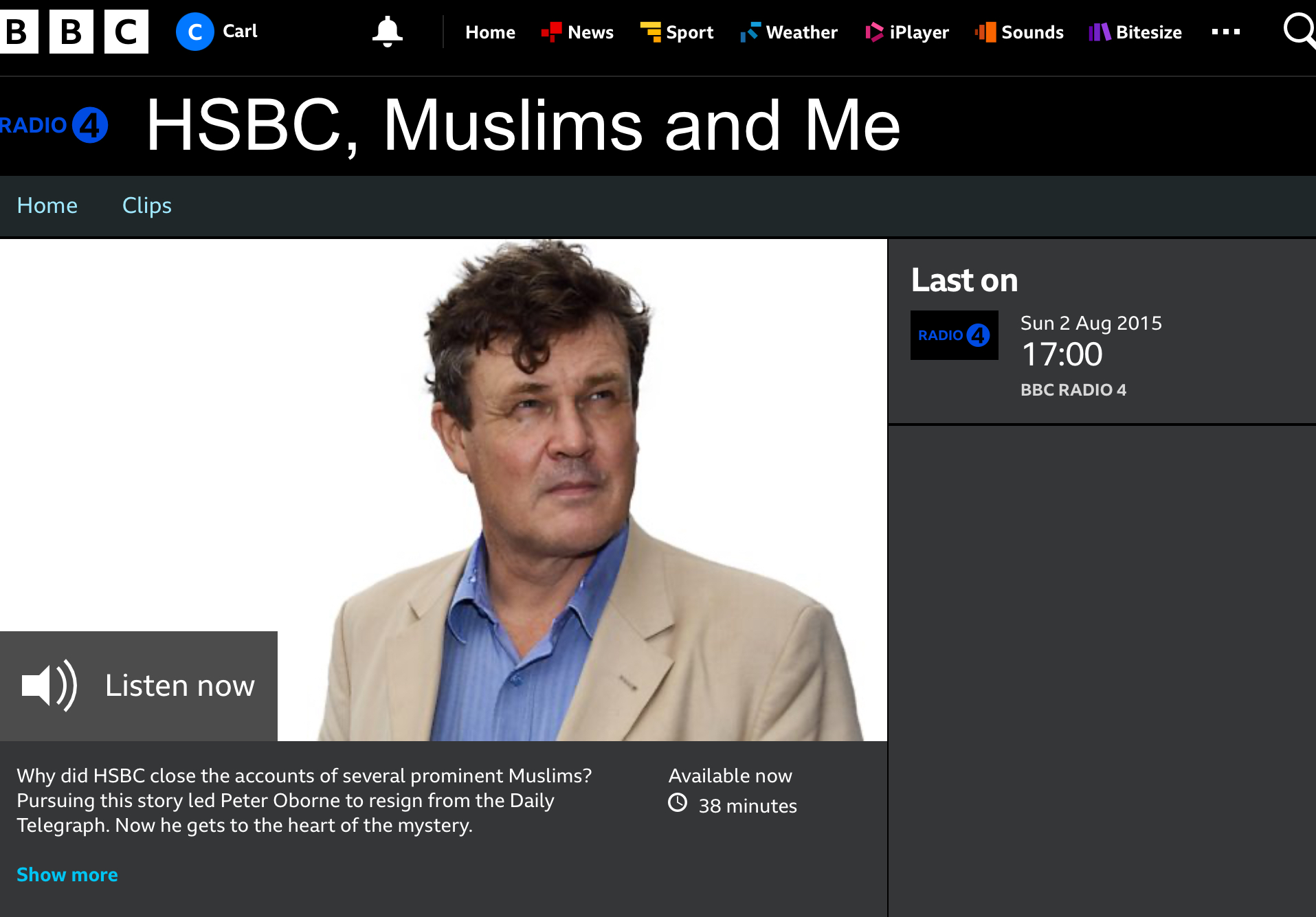It is a known fact in the Muslim community that over the last twenty years, swathes of Muslim owned bank accounts, have been shut down without explanation in the name of so called de-risking. Post 9/11 and the War on Terror, banks hurried to divest themselves of any account which could potentially render them subject to a lawsuit. There has been no outcry as scores of innocent individuals and major UK based charities found their livelihoods and activities suddenly turned upside down as access to banking facilities was suddenly denied.
Yet in the last week, Nigel Farage, a prominent political figure, reported that his account had been closed due it was said, to views which he held and which were deemed contrary to the values of Coutts bank. Because of his high profile, he was able to galvanise substantial media attention to what was resoundingly declared ‘an attack on freedom of speech.’

Suddenly, we saw newspaper headlines expressing angst and distress as dozens of column inches were dedicated to declaring the closure an attack on fundamental rights and freedoms. We witnessed a series of bold statements coming from government, expressing outrage and shock. The Prime Minister, Rishi Sunak, found the event so compelling, that he was forced to go public and declare:
‘[It] would not be right’ for a bank to close an account of somebody ‘exercising their right to lawful free speech. [The government is] cracking down on this process by tightening the rules around account closures. Our new Financial Services and Markets Act puts in place new measures to ensure that Politically Exposed Persons (PEPs) are being treated in an appropriate and proportionate manner’
Almost overnight new banking regulations were announced which mandated banks to provide customers with a 90 days’ notice period, rather than the current 30 days, before closing their account or downgrading their services. For the first time in the U.K. the bank will also have a new duty:
‘to spell out why they are terminating a bank account, boosting transparency for customers and aiding their efforts to overturn decisions’
‘Politically Exposed Persons’ Beware
What the press has not reported is that the new rules, still provide the banks with enough latitude to shut down accounts without providing detailed justification or explanation, to cancel banking services, to terminate accounts or loan agreements, if the bank believes a customer poses a risk to the reputation of the bank or can be classified as a ‘politically exposed person’ or PEP. The legal definition of a PEP provided by the UK Law Society, is anybody:
‘who has been appointed by a community institution, an international body or a state (including the UK) to a high-profile position within the last 12 months’.
Interestingly, despite all the cries of a breach in freedom of speech in the Farage case, it was his status as a PEP, which the bank maintains as the final justification for closing his account, despite documentation, which reveals the bank’s concerns over his values and opinions.
De-risking has been with us for decades and has targeted Muslims
Crucially, the shutting down of swathes of Muslim owned bank accounts under the banner of so called de-risking, reached a peak in the period post 9/11, during the so called War on Terror – a period which exposed banks to threats of legal challenges and potentially substantial penalties from lawyers representing victims of terror attacks. A series of high profile law suits in the US, attempted to argue that the banks, which provided banking facilities to organisations or individuals that were in some way linked or were deemed to be linked or associated with perpetrators of terror, were themselves culpable in the attacks and should therefore pay compensation to victims. Banks hurried to divest themselves of any potential risk to such claims, in a process defined as ‘De-risking’. This meant that the bank accounts of hundreds of Muslims were cross-referenced with data gathered and classified in the archives of agencies such as World Check (a Reuters organisation). It also meant that any reference as simple as an online article linking an individual or organisation to a suspect group was enough to place them within a category of ‘linked to terrorism’. Charities and individuals working in conflict areas such as Iraq, Yemen or Palestine, were prime targets and found themselves suddenly classified without their knowledge as ‘Politically Exposed Persons (PEPS)’ or worse still ‘Associated to Terrorism’.
Associated with Finsbury Park Mosque -that means you are a terrorist!
Mohamed Kozbar, Director of Finsbury Park Mosque, was one of many, who without explanation received an account-closing letter. He was lucky enough to have been alerted to otherwise confidential information held on him within the World Check database – which by virtue of his association with the Finsbury Park Mosque, had classified him totally incorrectly as a person ‘associated with terror’. He was fortunately able to successfully legally challenge World Check to remove this adverse classification from the database and he ultimately received compensation – althjough a paltry sum in comparison to the damage and inconvenience caused.
‘..an equitable system that upholds justice, equality, and respects the rights of individuals, regardless of their faith’.
In response to the recent pronouncements on the closure of Nigel Farage’s bank account,Kozbar had this to say:
‘When our bank account was closed in 2014, very few cared! When a man who thinks British Muslims are a “fifth column” has his bank account closed, there is national attention. Why?..Free speech should not be the purview of the privileged, famous & those with friends in the media. Many are saying that “you don’t have to agree with Farage, to think this is wrong”. Where were they when our bank account was closed, or that of other Muslims? Consistency and fairness is not too much to ask. The contrasting reactions to the closure of Farage’s account and our mosque’s account expose a distressing double standard. This double standard is a stark reminder of the pervasive Islamophobia that lurks within our society….We urge policymakers, financial institutions, and society as a whole to confront these double standards. Let us hold all parties accountable and work towards an equitable system that upholds justice, equality, and respects the rights of individuals, regardless of their faith.’
As long ago as 2015 renowned journalist and then the Chief Political Correspondent at the Daily Telegraph, Peter Oborne, made exposing the injustice of the Muslim bank account closures almost a personal crusade. It was an issue over which he eventually resigned his senior post at the Telegraph, when they refused to publish an article he had written on the issue. At that time he produced an excellent BBC radio documentary: HSBC, Muslims and Me – a riveting expose on the crude process of classification at World Check, which led to so many Muslims having their bank accounts closed. He was fortunate to be helped by an insider – a whistleblower who clearly felt that a serious injustice was taking place and believed the public had a right to know about it. Victims such as Anas Altikriti, Chair of Cordoba Foundation describe in the documentary how this account closures and those of his family members – even his children, left him devastated.
https://www.bbc.co.uk/sounds/play/b0639w47

Now the issue of bank account closures has become a national issue, it will be interesting to see if the UK follows the example of other European countries in guaranteeing the rights of all citizens to have access to banking facilities and whether the review of banking regulations will put an end to the right of banks to act effectively with impunity in the closure of Muslim owned accounts without explanation or justification.
















